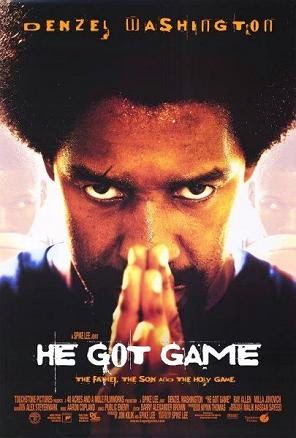When the subject of baggage comes up in a discussion of art the answer is usually simple: ignore it. This idea that a piece of art you like can be tainted or ruined by the personality or views of the person who made it annoys me - it shouldn't change the words in print or the images on screen unless they too exhibit their creator's downsides. Which is why someone like Spike Lee confuses the whole argument - his films and his public persona, however overblown and exaggerated the latter has become, say the same thing. A supporter for black rights who's done more by making films than waving banners.
Yet the one sided-ness of the modern Spike Lee persona - the one that's become little more than a negative name drop for rappers - appears to be turning people off of his films which, ironically, boast as their best asset Lee's ability to see almost nothing in black and white. And understanding that there's no yes or no questions, and that any answers you do find aren't easy ones. One good example of this would be in (the go-to for Lee's best film) Do The Right Thing. Because in the end, who in that film really does the right thing? Every character, whether black or white, whether they started the conflict in that film or simply got caught up in the heat of things, appears to do wrong. Lee's reputation would have you expecting nothing but a two hour preaching session. Instead, your moral compass is chucked into the middle of a minefield. Do The Right Thing is Lee's clearest message on race, yet it's the mostly forgotten He Got Game that shows Lee's biggest look into everyday morales of right or wrong, or doing something for others versus for yourself.
Jake (Denzel Washington), in prison and still facing the majority of his sentence, is given the opportunity to get let out early if, in the short time he is given on the outside, he is able to convince his basketball prodigy son Jesus (Ray Allen) to go to college. The problem: Jesus wants nothing to do with his father and everyones constant touting of this as the biggest decision of his life isn't making him excited over the educational route. Supporting characters include Lala (Rosario Dawson) Jesus's girlfriend and Dakota (Milla Jovovich) a prostitute Jake runs into not long after getting out.
Like in most Lee films, like the whole issue of race, things look like they should be easy. If Jesus agrees to go to college then: he'll be getting a full time scholarship for free; he can have his shot in the basketball leagues; the money would help out his girlfriend and little sister; his father would get a lesser sentence; and from the way Lee (maybe over-) presents it, the whole nation would celebrate Jesus going to college. But Lee presents a of cast of characters where no one is making smart choices, or good ones: Jesus is confused by all the responsibility and may not even go to college; he later takes very little persuading to cheat on his girlfriend and blows off a conversation about her maybe being pregnant; Jake is unable to hide his intentions (that is, playing with his son's future for his own good) and for a man given a brief chance on the outside he still acts like a violent thug; and then there's all the universities and marketing men surrounding Jesus - like they've got the kid's best interests in mind.
In the end, like most Lee films, the answer to the film's original question ceases to matter. Lee knows (or at least knew) that the things people want worked out the simplest will become so cluttered that looking for an easy solution is nothing but deluded wishful thinking. The only thing someone can do is, well, try and do the right thing. This isn't a perfect movie. Like Lee's Summer of Sam (released a year later) the direction is overly flashy: the camera moving around too much and sudden editing cuts. But if Lee and his newest films are now nothing but caricatures of the energies of a good cause focused in the complete wrong place, then films from Lee's golden years should be even more craved as important relics from a filmmaker spreading the word that doing the right thing isn't usually the easy thing and that sometimes truths don't always sound as poetic and romantic as you'd think, in the case of He Got Game: that sometimes you just have to do things for yourself and have faith that others can manage their own happiness.


No comments:
Post a Comment